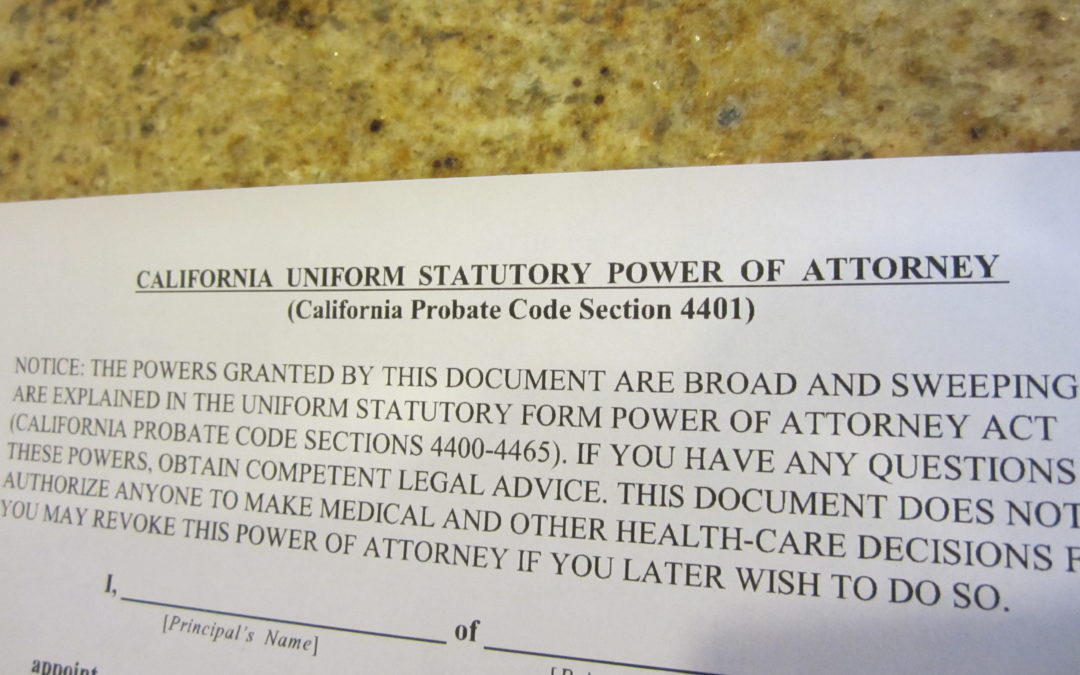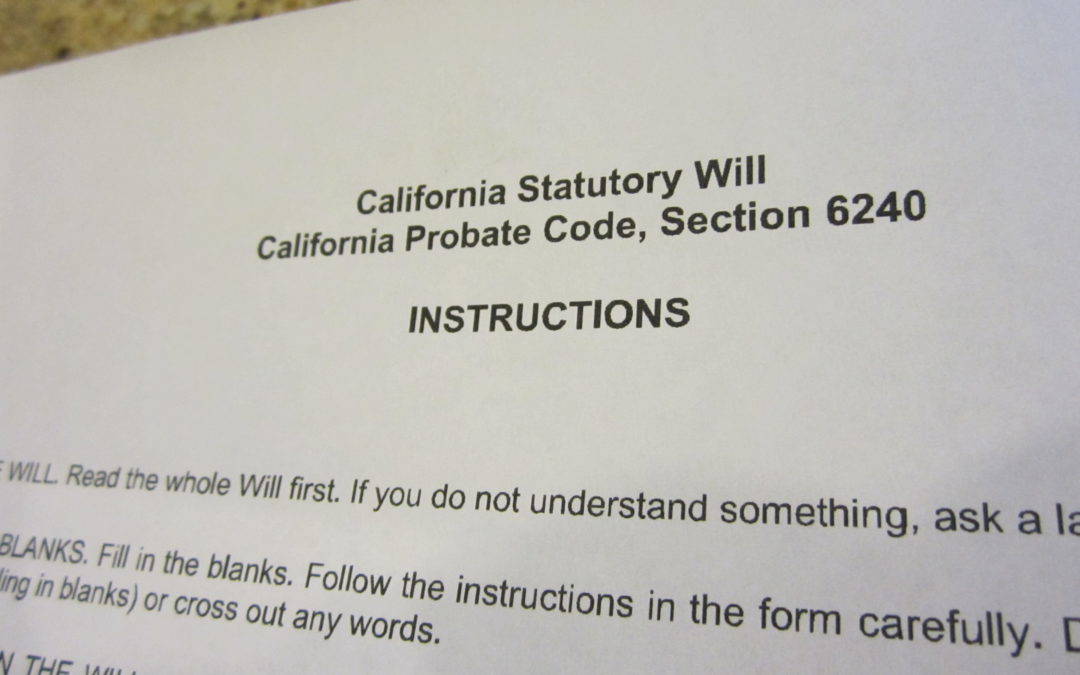by Andy Chen | Apr 10, 2019 | California
In a prior post, I went over how it’s possible in California to use a newspaper ad to serve a defendant in a lawsuit who either can’t be found or purposely does not want to be found. Serving a defendant by publication in this way is the exception rather than the norm. Today, I’m going to go over another service method which usually isn’t the norm, but really should be: Service by Acknowledgment. The applicable statute in California is Code of Civil Procedure section 415.30(a). “Service by Acknowledgment” is a fancy of way of saying that the summons and complaint in the case is simply mailed to the Defendant along with a form (called the “Acknowledgment”) that the Defendant then signs and mails back to the Plaintiff. The fact that the Defendant signs and mails it back is the proof that the Defendant was served. The benefit of the Service by Acknowledgment method should be obvious: it’s extremely cheap and simple. All it takes is the cost of postage and the Defendant’s cooperation. In comparison, the cost of hiring a process server to locate and serve a defendant would almost certainly be more, especially if the process server has to make multiple attempts. For these reasons, I generally try to use Service by Acknowledgment whenever possible. In California, there are standard Acknowledgment forms. For California family law cases, the Acknowledgement is California Judicial Council Form FL-117. For regular civil cases (e.g. breach of contract, personal injury, etc) in California, the Acknowledgment is Judicial Council Form POS-015. Two points to know about Service by Acknowledgment under CCP section 415.30: The...

by Andy Chen | Mar 12, 2019 | California
I was on a road trip recently through the Central Valley of California and stopped in at a Jack In the Box. I forgot where I was heading, but I’m fairly certain it was early morning because I remember ordering a most excellent breakfast burrito along with an absolutely terrible cup of coffee. Burritos and coffee aside, though, I cam across this sign while waiting for my order. Because I’m me, I snapped a photo of it to aid in discussing it with all of you. The California law the sign is citing to is the CA Civil Code and it’s specifically section 1749.5(b)(2) which states that, as of January 1, 2008 ” Notwithstanding paragraph (1), any gift certificate with a cash value of less than ten dollars ($10) is redeemable in cash for its cash value.” Paragraph (1) of CA Civil Code section 1749.5(b) further states that ” Any gift certificate sold after January 1, 1997, is redeemable in cash for its cash value, or subject to replacement with a new gift certificate at no cost to the purchaser or holder.“ CA Civil Code section 1749.45(a) defines “gift certificate” to include gift cards as, I believe, most people would normally interpret the term (i.e. a card issued by and usable at a single merchant or retailer). However, section 1749.45(a)‘s definition of “gift certificate” excludes those gift cards “usable with multiple sellers of goods or services” provided that any applicable expiration date is printed on the card. I rarely use gift cards so these multiple seller cards didn’t ring a bell. Sure enough, though, the very next time I was at the grocery store, what do I see but this: Section 1749.5 also goes over the...

by Andy Chen | Mar 10, 2019 | California
If you live in California and you’re a US citizen, having to serve on a jury is a fact of life. Sooner or later, you’ll have to do it. Technically, registering to vote doesn’t increase your chance of getting called for jury duty. However, the last 2 times I’ve been called for jury duty have — by pure coincidence, I’m sure — been right after I moved to a different county and updated my voter registration. This post is going to go over some of the applicable law in California when it comes to serving on a state jury (e.g. in Superior Court in California). The post will go over some of my own experience serving on a state jury. I have not yet served on a federal jury before so I’m not going to cover that. Jurors in California state court do get paid for their time when they serve, but it’s a paltry $15.00 per day (see CA Code of Civil Procedure section 215(a)) and it only begins on the second day that they serve. This $15 rate hasn’t changed since 2004. In addition to the pay, jurors are also reimbursed for the miles they drive to and from the courthouse, but that’s only at 34 cents per mile starting on the second day (see CA Code of Civil Procedure section 215(c)). To compare, the IRS reimbursement rate for miles driven was 54.5 cents for 2018. The $15 per day pay poses an obvious problem to two categories of jurors: (1) those living paycheck-to-paycheck, and (2) those who aren’t living paycheck-to-paycheck, but nonetheless still can’t afford to...
by Andy Chen | Feb 20, 2019 | California
A very common question I encounter is some variant of ‘How do I file a lawsuit against a person if I don’t know where they are?’ I often see this from people who want to file for divorce (in California, divorces must be done in court so a lawsuit must be filed) because they want to get married again and don’t want to commit bigamy. This concern exists these people never got a divorce to end their prior marriage. They simply moved out (or their spouse moved out) and each went on with their lives. Sometimes a year or two passes before the idea of wanting to get married to someone else pops up, but sometimes 10 or more years might have passed and, for instance, people move far away or pass away. In such a situation then, how can this person file a divorce case against their spouse if they haven’t seen their spouse for years? Once filed, the divorce papers have to be served on the spouse and that involves finding the spouse. Somehow. The answer to that question is to do Service by Publication. You might have more commonly heard this described as ‘taking out a newspaper ad’. Most newspapers will have a section where legal notices are posted although it is debatable who or how many people actually look at those ads. I’ve used a divorce scenario to illustrate a situation where service may need to be done via a newspaper ad, but the idea of doing Service by Publication is applicable in California, at least, to a variety of civil lawsuits where serving the...

by Andy Chen | Feb 15, 2019 | California, Employment
One of my favorite places to go eat in the San Jose area is El Camino Mongolian BBQ. If you’re ever in the Santa Clara, CA area, stop on in. You can mention my name, if you want. (It likely won’t help you, but you can always mention my name. Ahahahahaha… okay, moving on). I was at El Camino Mongolian BBQ recently and snapped the above photo. The owners (Sunny and John) were hiring for kitchen staff. The subject of this blog post is going to be the two time ranges listed for the Kitchen help. If you’ve ever been to a restaurant — and I’m going to assume everyone reading this has — then it shouldn’t be a surprise to you that restaurant workers don’t work a normal 8 hour day. There’s a wave of people for breakfast (assuming the place offers breakfast) and then another wave for lunch and then another wave for dinner. It’s not uncommon for restaurants to shut down in the mid-afternoon (e.g. 3 PM to 5 PM) in between lunch and dinner. In California, a schedule involving a shut down period like this is called a Split Shift. Depending on their hourly wage, an employee may be entitled to additional compensation if they have to work a Split Shift. The governing law here is actually not going to be in a statute (e.g. California Labor Code) or a case, but rather it’s going to be in California regulations. These regulations are codified in Title 8 of the California Code of Regulations from sections 11010 to 11170. If you see references such as “8...
by Andy Chen | Feb 13, 2019 | California, Estate Planning
A while back, I put a video out on my Youtube channel describing what a Power of Attorney (POA) is and what it can do for you. Here it is, in case you missed it. I also posted previously on this blog about what happens to a Power of Attorney in California when you get divorced and your spouse is your POA agent. In this post, I’m going to go over what happens when a POA that has been properly signed is, nonetheless, not recognized. For sake of illustration, let’s say that your elderly mother has signed a POA naming you as her agent. Your mom wants you to manage her money (e.g. pay her bills) and to do that, you need to access her bank accounts, but your mom’s bank is refusing to cooperate with you. What do you do? The California statute that applies here is Section 4406 of the California Probate Code. One important thing to recognize first, though, is that 4406 only applies to what are called “Uniform Statutory Powers of Attorney”. What this basically means is that 4406 doesn’t apply to any random POA that gets written up, even if it’s written up properly. 4406 only applies to the specific POA that is explicitly specified in the California Probate Code (specifically, section 4401). If you have a Uniform Statutory Power of Attorney in California and it’s been properly signed by the principal (see CA Probate Code section 4121) and a third-party (e.g. a bank, like in this hypothetical) is refusing to honor it, 4406 provides for the following: The agent can sue the third-party...

by Andy Chen | Jan 8, 2019 | California, Estate Planning, Family Law, Individual
I had a post before about what happens in California to your will after you get divorced. Many people have their spouses named in their will in some way (e.g. to be executor). In nearly all cases, I would imagine you don’t want your ex-spouse to have control over your estate when you’ve died. Today, though, I’m going to go over a similar question: what happens in California to your Power of Attorney or Durable Power of Attorney document after you’ve gotten divorced? As with wills, many people name their spouses as their power of attorney agent or durable power of attorney agent and, as with divorces, most people likely don’t want their ex-spouses having control over them once the divorce is finally over. The relevant law here is going to be Section 4154 of the California Probate Code, section (a) of which states: “If after executing a power of attorney the principal’s marriage to the attorney-in-fact is dissolved or annulled, the principal’s designation of the former spouse as attorney-in-fact is revoked.” Section 4154(b) then goes on to say that if divorce or annulment of the marriage was the only reason why the power of attorney was revoked, then remarriage of the principal and attorney-in-fact will reinstate the power of attorney and the attorney-in-fact’s authority under it. If, however, the power of attorney was revoked for other reasons too and the principal and attorney-in-fact just happened to get divorced at the same time, then them remarrying does not reinstate the power of attorney and the attorney-in-fact’s authority. If you compare what happens to a will under section 6122 of...

by Andy Chen | Jan 4, 2019 | California, Family Law, Individual
This post is going to be about what happens to assets that were not previously disclosed during a California divorce case. This failure to disclose could be intentional, such as your soon-to-be ex-spouse purposely trying to hide bank accounts and other property from you. For instance, suppose you were a stay-at-home mom and your husband was the one who worked outside the home. Even though all the property the two of you acquired during the marriage is likely going to be community property to which you would be entitled to half, he might view it as all rightfully belonging to him because he was the one who went out to work for it. He might, for example, try to hide it by putting it all under his brother’s name, his elderly mother’s name, etc. The failure to disclose could also be accidental. People can be forgetful, even when they intend to be honest. Depending on your level of wealth, the length of the marriage, etc, it is possible that your soon-to-be ex-husband, for example, might forget that he had a 401K from a job he worked 20 years ago that he has never touched. Theoretically, all assets and debts should be disclosed during a divorce and each party should — in theory — have total access to all information regarding the couple’s finances. The reality, of course, is never that perfect. The fact that financial disclosure during a California divorce is voluntary and on the honor system doesn’t help either. Bottom line: if you’re involved in a California divorce and you believe your soon-to-be ex-spouse is trying to hide...

by Andy Chen | Jan 3, 2019 | Individual, New York
Yesterday, there were news stories stating that a new law went in to effect in New York on January 1, 2019 allowing for birth certificates specifying a non-binary gender (i.e. not male and not female). Here are two in particular: “New York law now allows gender-neutral birth certificates” (kcra.com; January 1, 2019)“New York Rings in New Year by Offering Gender-Neutral Birth Certificates” (dailysignal.com; January 2, 2019) The headlines are misleading for this reason: It isn’t a New York state law. Instead, the law that went in to effect yesterday is a New York City law. This law was signed by New York City Mayor Bill DeBlasio on October 9, 2018 and went into effect January 1, 2019. For those interested, this new law is under the Administrative Code of the City of New York. If you want to look it up yourself, it is Title 17, Section 167.1 entitled “Sex Designation on Birth Records”. As an aside for those interested, California has a law that allows for gender-neutral birth certificates also. Called the Gender Recognition Act, it was passed as California Senate Bill 179 (SB 179) in October 2017 and went in to effect January 1, 2018. At the time, it made California the first state in the US to recognize a third gender. As usual with any blog post regarding New York, I need to make clear that while I am licensed to practice law in New York state, I don’t maintain an office anywhere in the state of New York (at least as of the date of this post). As a result, I can’t practice law there...

by Andy Chen | Jan 2, 2019 | California, Estate Planning, Individual
After you get divorced, a lot of things happen automatically under California law. Many of these things have to do with estate planning. In this post, I’m going to go over how a divorce affects how California treats wills that either spouse has made. In previous posts, I’ve gone over how to make a will in California, how to disinherit your children in your California will, and how to omit your spouse in your California will. If you haven’t seen those posts, I encourage you to go take a look. The relevant law here for how a divorce affects a will is going to be in section 6122 of the California Probate Code. A very similar statute (Section 6122.1 of the California Probate Code) applies to domestic partnerships also. Under section 6122(a), the following happens automatically upon a divorce unless a will executed after the divorce provides otherwise: Disposition of property to the former spouse is revoked;Special and general powers of appointment conferred upon the former spouse are also revoked;Provisions specifying the former spouse as conservator, guardian, trustee, or executor are also revoked. In the event of a divorce, section 6122 treats the former spouse as if they had already died. In the event these spouses get remarried, however, section 6122(b) automatically reinstates/revives these same provisions of the deceased spouse’s will. As always, this post is not meant to be a comprehensive explanation of how a divorce might affect your will or the will in the particular situation you are dealing with. If you are outside of California or your situation doesn’t involve California at all, likely none of...







